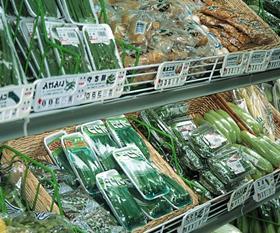
Tokyo shoppers were picking their way through retail produce sections very carefully on Sunday after the discovery of radioactive contamination in spinach and milk fanned national fears about food safety, according to local media reports.
Nuclear reactors at Japan’s Fukushima Daiichi power plant have been leaking radiation since the earthquake and tsunami devastated the country on 11 March. And while the fight to stabilise the stricken plant appears to be making progress, a fresh crisis is emerging amid rising concerns over radioactive contamination of food and water.
Traces of radioactive iodine exceeding Japan’s stringent national safety standards have been found in spinach collected from six farms located between 100km and 120km to the south of the reactors in Ibaraki prefecture, a major vegetable production region. The government has also since confirmed contamination has been found on two more vegetables and in three more prefectures.
Japan’s chief cabinet secretary Yukio Edano stressed these levels posed no “immediate” health risks and called on the public to stay calm. The government said that continuous daily consumption of the tainted spinach would result in absorbing one-fifth of the radiation received during a CT scan. “Even if you consume the spinach in question for a long time, it will not pose an immediate threat to your health,” Mr Edano said.
Despite such assurances and the absence of any scientific basis for health concerns, the detections could have a deep impact on Japanese consumer behaviour, not least given the population’s sensitivity to food safety issues.
According to media reports, consumers' fears were already evident in the fresh produce sections of Tokyo retail outlets on Sunday. The Associated Press (AP) reported that shoppers in one Tokyo supermarket avoided a bin of spinach grown in Ibaraki prefecture in favour of a bin labelled as coming from Chiba prefecture. While panic buying, together with disruption to retail operations, left many Tokyo supermarket shelves bare last week, the AP reported that this trend had subsided on Sunday. Rather, consumers were scrutinising the source of items and trying to avoid items that they feared might be tainted.
With consumers' fears threatening to balloon out of proportion with the actual risks, analysts have also raised concerns as to the impact on Japanese farmers.
The Japanese government has now prohibited the sale of spinach from Ibaraki Prefecture while officials in Fukushima halted the distribution of locally grown vegetables outside the prefecture. Restrictions have also since been placed on spinach grown in Tuchigi and Gunma prefectures.
“The government is going to have to grapple hard with what to do about this,” Jim Walsh, an international security expert at the Massachusetts Institute of Technology told CNN. “If they outlaw all the produce from that region `Ibaraki`, that pretty much is putting the stamp of death on those farmers. They’re never going to be able to sell any produce.”
On Monday, the World Health Organisation weighed in on the issue, urging Japan to act quickly to ban sales of food from areas around the damaged Fukishima plant that might be affected by contamination. A spokesperson for the Geneva-based UN health agency also warned that contaminated food posed a greater long-term risk to residents' health than radioactive particles in the air. Japanese authorities are expected to decide by Tuesday on a comprehensive plan to limit food shipments from affected areas.
Fukushima, north of Tokyo, ranks as one of Japan’s largest producing regions for fruit, vegetables and rice. Ibaraki, south of Fukishima, is a major vegetable production centre and a key supplier of fresh produce to Tokyo.
According to Japanese fresh produce importer-distributor Goldspan, Fukushima is a major supplier of a range of fresh fruits, including peaches, cherries, apples, pears, grapes and persimmons.
“People fear radiation contamination on those agricultural products grown in the prefecture. There is no scientific rationale behind those concerns, but the sad fact is that the fear will influence consumers’ behaviour,” a spokesperson for the company told Fruitnet.com. “On the other hand, imported fresh fruit and vegetables are likely to gain more exposure.”
Indeed, public anxiety could yet spread to hurt sales of Japanese produce that are not even grown in areas affected by contamination, and some sources anticipate that this would only boost demand for imported fruit and vegetables.
Goldspan notes that the sharp appreciation of the Japanese yen in the wake of the earthquake is also likely to benefit fresh produce imports in the short-term.
“The yen is soaring to record high levels, triggered by purchasing by the insurance companies,” said a company spokesperson. “Nobody is certain how long the strong yen will continue but the general expectation is that it will last for between two weeks and a month. A stronger yen will certainly favour purchasing of imported produce. When the market sees a general shortage of food items at retail level, discount sales will also diminish.”
On the flip side, the high-flying yen will only add to woes for Japan’s fresh produce exports, which already face potential issues with consumer acceptance amid fears of radiation contamination. On Sunday, Taiwan’s Economic Energy Council said radiation was detected on fava beans imported from Japan, albeit at levels that were too low to harm human health. Food regulators in Singapore and Hong Kong have also begun testing Japanese fresh produce imports for contamination.



